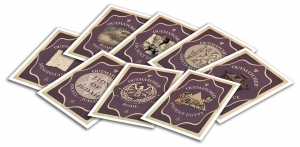Outmatched™ history card games are available for both ancient history and medieval history. I reviewed Outmatched™ Ancient History.
Outmatched™ Ancient History is a learning tool in a game format that reinforces lessons on ancient history. It will be most useful for those who want students to retain detailed information regarding key historical events, places, and people from the Mesopotamian, Greek, and Roman cultures as well as from biblical history and Greek literature and mythology. While it might be useful for all students, those following a classical model of education are most likely to find it useful.
Outmatched consists of eight card decks, two pads of score sheets, and instructions, all packaged in an attractive, sturdy cardboard box. Purchasers also get access to free downloadable files.
The eight card decks address different eras and cultures in ancient history:
- Ancient Greece Geography
- Greco-Roman World
- Archaic and Classical Greece
- Ancient Egypt
- Ancient Rome
- Fall of the Republic
- Mesopotamia
- Israel and Judah
Each deck has 48 game cards, and these cards form 24 matched pairs that present related information. For example, “Temple to Athena” on one card matches with “Parthenon” on another, and “Upper Egyptian Landmarks” matches with another card that lists “1. Thebes 2. Luxor 3. Valley of the Kings.” An answer key on one card in each deck lists which numbered cards--all cards have an identifying number--match with one another.
Free downloadable files have a full page for each deck with all of the information on each matching set of cards. The instructions recommend that players not familiar with the details on the cards take time to study the pertinent information page for that card deck before playing a game to avoid frustration. While some of the relationships are clear from this information, others are not. These pages do not explain the background or other reasons for the connection such as why the "Hyksos Invasions" are linked to the "Decline of the Middle Kingdom [of Egypt]." It is assumed that such instruction has been given previously.
Detailed directions describe how the game is played. Players essentially have to match a card in their hands (with some exceptions) to one played on the table. They score points for each matched pair. Information on each card is read aloud when it is played. In some situations, players who think they already know the information on the matching card, but don’t have that card in their hand, can try to call out that information before the player holding the correct card locates and plays it. So there is an incentive to memorize the information.
Once players are familiar with a deck, you can add the “kicker” card. It has five questions and answers that the person assigned to be lead player can ask other players, one question to one player at a time. If the other player answers a question correctly, he gains points. If he does not, the lead player who read the question gets those points instead.
You can use card decks in the order in which you study history, but it is important that each deck be used frequently, to the point where students master the information. The instructions warn that play will be difficult at first as players familiarize themselves with the cards. By the third game, players should be able to play quickly and competitively. As the instructions explain, by the eighth time around, play is likely to become mechanical, so it is time to begin the next deck. However, after the second deck becomes mechanical, it’s time to replay the first deck, continually adding new decks, then reviewing previously-mastered decks.
There is a “tracker” card in each deck for recording the number of times each of four players has played that deck. Extra tracker card sheets are in the downloadable files.
The game works best with four players since all cards need to be in play. With four players, each player has to hold 12 cards as the game begins. You can see the difficulty with fewer players—they would find it very difficult to hold 18 or more cards and look through them at a pace fast enough to keep the game moving—although this might be possible with students who are reaching the mechanical stage. Parents or others might need to join in to have enough players; be sure to give those filling in some time to study the downloadable page for that deck in advance or they might be at a severe disadvantage.
The entire system is well thought out, apparently developed through actual usage with different groups. While this isn’t likely to be the game kids beg to play in their free time, it should prove to be an enjoyable way to review and reinforce historical information.









